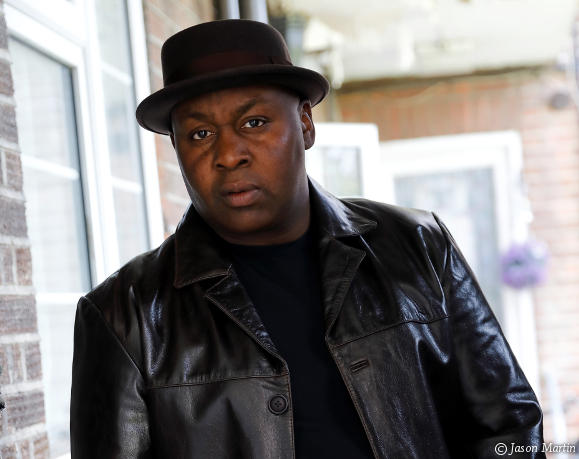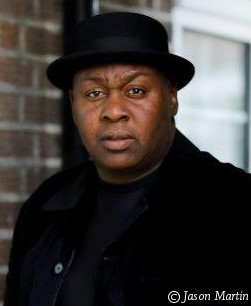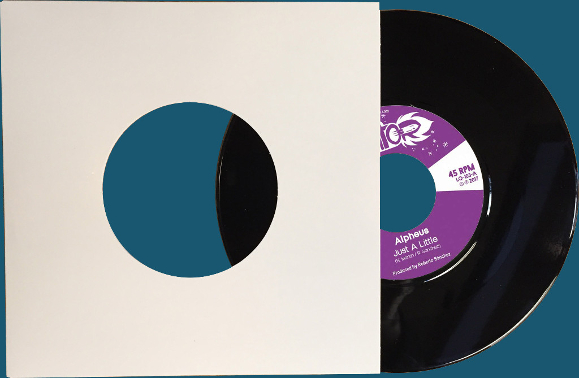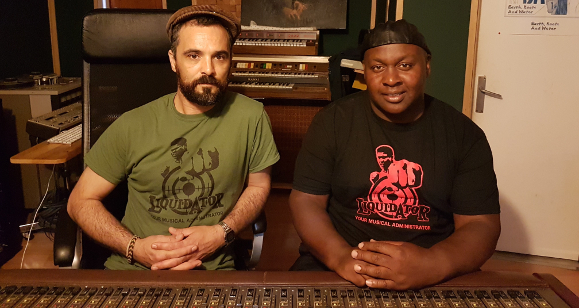Articles about reggae music, reviews, interviews, reports and more...
Interview: Alpheus & Roberto Sanchez (2017)
- Home
- Articles
- Interviews
- Interview: Alpheus & Roberto Sanchez (2017)

Interview: Alpheus & Roberto Sanchez (2017)
"We wanted to raise the bar on this third album"
Sampler
For nearly 20 years, Alpheus has listened to his musical inner voice. In 1998, when many Londoners were inspired by Jamaican dancehall or home-grown offshoots like speed garage or drum ‘n’ bass, he was in the USA signing to Coxsone Dodd’s legendary reggae label Studio 1.
After a brief, respectable interlude as a contemporary romantic singer in the 2000s, Alpheus decided to travel even further back into the Studio 1 era. He took a pledge to sing only ska and rocksteady - cementing a bond with another man who wasn’t made for these times, Spanish producer Roberto Sanchez. Their two albums From Creation (2011) and Good Prevails (2014) paired original Alpheus songs with pristine excavations of vintage 60s rhythms. Each was a critical favourite of its respective year.
On Monday October 16th, Alpheus and Sanchez release the first single from their third album in the trilogy (via Spain's Liquidator Music). The double A side Just A Little/Sleeping Giant features the same dedicated rhythm and song craft - with some subtle differences. There are no re-licks of old rhythms: only original compositions by both Alpheus and Sanchez. Just A Little marks a shift from ska and rocksteady towards faster-paced “skinhead reggae” of the late 60s and early 70s.
Angus Taylor attended an exclusive private album listening party at a secret London location. There, he conducted the first interviews with Alpheus and Roberto about the singles and the new project. Most information about the other tracks is embargoed - but everything suggests another album destined for the critics’ yearly top 10s.
ALPHEUS

How and when did you decide you are going to make a third album?
ALPHEUS: We always wanted to make a third album but we wanted the financial side to be right. We wanted to at least make back everyone's investment on our previous albums so we could go into this next album. Even though we love doing what we're doing, unfortunately, we still need these material things to make it happen.
We got good support from the record label Liquidator and that's what really made us make this third album. We just hope everybody can sacrifice the same as what we're all doing - the band, the producer Roberto Sanchez and the label. We hope everybody can put in the same so we can continue to make good music. It needs to be done for all artists and all music so that quality can be put back in to the product that they like.
 We always wanted to make a third album but we wanted the financial side to be right
We always wanted to make a third album but we wanted the financial side to be right
Was the decision to create only original rhythms financial, artistic or both?
ALPHEUS: I think it was more artistic because it's something that we wanted to do from when we made Good Prevails. While we were making Good Prevails we said "Alright, the next album, we're going to really take longer on it. We’ll make these compositions be original from Roberto’s side. And I’ll go even deeper on the writing side". We feel that we have done that on this one. This is a totally original album now. There are no re-licks or remakes. All of the compositions are his and mine so we've really gone into a combined process.
How was the process different using all original compositions?
ALPHEUS: It started with me trying to select the kinds of rhythms that I would like Roberto Sanchez to make. And he's already got his mind and his concept on the rhythms that he would like to make. Everything was created from scratch. I had ideas about the feeling. So we would listen to some of our favourite songs in rocksteady and ska and I'd say "That's the feeling we want". And I’d listen to some of the tracks from our last two albums and I'd say "This is the feeling that we want".
And then over the course of about five trips to Spain to the studio, I was singing sketches with no rhythm at all - just Roberto playing like a skeleton on a keyboard. He'll just be playing a few notes on a Hammond. Or sometimes it would just be the metronome, singing to no music and then he will say "Okay, leave it with me".
And then maybe three weeks later, he'll send me down some ska or some rocksteady that would fit the sketch of lyrics that I put down. So it was a slow process and that's why it took longer to get this album out than the last two. It was all originals from scratch with even more thought - because we really wanted to raise the bar again on this third album in our trilogy.
 This is a totally original album. There are no re-licks or remakes
This is a totally original album. There are no re-licks or remakes
Let's talk about the musical shifts in the album. You’ve said that where the previous albums were rocksteady and ska this album is more “from the rude boy era”. Where are you taking inspiration from?
ALPHEUS: We’re talking about 1969 when rocksteady was going into Jeggae. We’re talking about end of 1968 to 1970 - there was a real creation going on between rocksteady and reggae. They were trying to make it fast so that you could dance to it and at the same time you could hear the guitar going “jeh-keh jeh-keh jeh-keh jeh-keh”. That is the rude part of it because that was the time when you had a lot of people like Prince Buster and Desmond Dekker creating great hits in England in the late 60s. I love that time. I was in my mum's stomach and I could hear it! (Laughs)
So do you mean what they call early reggae, skinhead reggae or Trojan reggae? The very athletic, dance-driven reggae.
ALPHEUS: The short-sleeved, plaid shirts. Tidy. Skinhead, right. When it was the original skinheads. The real good skinheads that are the real meaning of skinheads. The real musical one love guys.
On your previous albums some of the rhythms were at the bridging point between ska and rocksteady. This album is more about the bridge from rocksteady to reggae.
ALPHEUS: Yes! Exactly. And I think way you say there is a bridging point that is the Jeggae. When I speak to my mother I say "Mum, what was it like then - in ’68 and ’69?" And she's like "Boy, we'd go a dance every week. And we used to listen to Nicky Thomas who sang Have A Little Faith and was the jeggae king". Mum was a Nicky Thomas fan and that style was important. For me doing the shows I've done in the last few years since Good Prevails, I see there is an audience for that part of the music I love.
So after you and Roberto had created the skeletons what happened next? How did Roberto flesh them out?
 ALPHEUS: Oh my God. He’s got a lot of people playing on this one. He got musicians from Lone Ark Rhythm Force of course. We got Inigo playing most of the drums who is a fantastic ska drummer. He played on all the albums. And then Roberto wanted to enlist a little bit of a different colour on some instruments. So he would use members of the Naja Vibes band.
ALPHEUS: Oh my God. He’s got a lot of people playing on this one. He got musicians from Lone Ark Rhythm Force of course. We got Inigo playing most of the drums who is a fantastic ska drummer. He played on all the albums. And then Roberto wanted to enlist a little bit of a different colour on some instruments. So he would use members of the Naja Vibes band.
Naja Vibes from Switzerland. Roberto mixed their projects with I Kong.
ALPHEUS: Yeah! That’s how I know I Kong. It was quite surprising because he got the man that plays the bass and he got the keyboardist Mathias to play a few lines. I didn't know until after it was all done. He got a lot of people in. He got a lot of musicians in to really put a different colour because we’re making part three, so we're really trying to make sure it's a good sequel.
Aside from all original rhythms and guest musicians, what other things were you trying to improve?
ALPHEUS: That's a fantastic question. When I was speaking to Roberto Sanchez I was saying "Listen man, do you think we can make another one as good as the last one?" He always says "Yeah man, no problem!" I'm thinking to myself "Is he sure?" Because we went deep on From Creation. We went really deep on Good Prevails - and he's going to go deeper on this?
So the things that we improved were Roberto investing in some serious instruments. Some old guitars, some old basses, the big double bass and this organ called a Farfisa that was used in the late 60s, early 70s time. So he's gone deep. We wanted to concentrate on the instruments being correct so that they sounded organic and retro. We wanted the mix to be more retro and we wanted it to be original rhythms. And for the lyrics I wanted to go deeper to my soul. The period of the last three years worldwide has been so terrible I had a lot to feed off.
Which instruments did Roberto play?
ALPHEUS: He played the bass, the double bass, he played some guitar, the organ. Those are the main instruments I know that he played. He plays on every track.
And which instruments did Alpheus play?
ALPHEUS: (Laughter) Come on! Listen, I really wanted to play…
Hasn’t it been 10 years that Roberto has been asking you to learn an instrument?
ALPHEUS: Oh man!
Did you play the triangle?
ALPHEUS: You know something? I should have! That's not even funny because I should have gone in there and played the... what Mr Dodd used to come in sometimes and play… The piece of wood with all the lines cutting it?
The guiro?
ALPHEUS: And he would use a fork and scrape it a few times. Just to get his name on the track and then that was it. That's what I should have done!
How hard was choosing which songs would be the first singles?
ALPHEUS: We have such a strong album that we didn’t even know which ones are going to be singles. We wanted the title track to be a single but it didn't make sense to drop that as the first single, then three months later an album with the same name - it's not done.

One side of the new single is Just A Little which is a major key, soulful, skinhead reggae track. What’s it about?
ALPHEUS: It’s a cool jeggae tune I wrote about a man I know that always believes he can love every woman - even if the lady isn’t his! He just wants a piece of every single girl he sees. It’s an early reggae rhythm composed by Roberto Sanchez and played by Lone Ark Riddim Force band.
The other song is Sleeping Giant whose rhythm people will recognise from Roberto’s Same Old Story album with Keith and Tex.
ALPHEUS: Sleeping Giant is another wicked rhythm composed by Roberto. A ska gem, for real. This song I wrote because it seems like when you are always nice to people and show them your best face, they think they can take advantage of you. It’s wrong to try to judge a book by its cover, so they’d better beware because we'll defend that proper, when they least expect it. I think we can all relate to that.
I had a really good friend. Really close for years. He’d always been nice and one day he chose to be horrible and rude. I couldn't believe it. And you know why that was? Because I showed kindness. It's the same as that Glen Washington song goes - Kindness For Weakness. One of the best songs ever made. They take your kindness for weakness and then they have to see the giant come out. That's why the rhythm asked me to ride it that way and to be aggressive and tell the story that way on an up-tempo groove.
On Just A Little your singing is very melodic whereas for Sleeping Giant the vocal is almost a kind of sing-jay style. You're chopping it up a bit more and riding in the rhythm like a deejay would.
ALPHEUS: Fantastic observation. There is a bit more of a sing-jay on certain tracks. Sometimes as an artist the rhythm tells you what to do. That rhythm was saying to me as an artist, “you have to ride this”. I felt like there was more attitude so sometimes I do my sing-jay part. I've done in in the past with songs like Ultimate from the first album. I like to get in there and do my culture. My blood is Jamaican so sometimes it comes out.
 My blood is Jamaican so sometimes it comes out
My blood is Jamaican so sometimes it comes out
When you think back to Prince Buster and Derrick Morgan they had a kind of deejay hardness and attitude before the deejay thing got big.
ALPHEUS: Because in those times the black people that were making rocksteady and ska were facing so much adversity because of society and how we will being treated. We had to look proud and stand proud.
That's why the rude boy era came in because in the 50s when all of my uncles and my mum and dad came off the ship they were wearing the porkpies and the plaid shirts with the pants that were too short. But they were too short not because it was the style. That was all that they could put and look neat. It transferred to the skinheads who wanted to look like the guys that came off the boat. So due to that there was a strong attitude. You had to have pride and they put it in the music. You would hear Prince Buster with his strong voice and you will hear singers riding the rhythm with stance because it was attitude music.
You mentioned about how hard it was for black people in the 60s. How does it feel to see racism is still so present in 2017?
ALPHEUS: It doesn't feel good. I come from a 60s family. My father came to England in 1945. One of the first to come here. When I listen to some of the struggles that mum and dad had to face as Jamaicans in England trying to find a place to live - "No blacks, no paddies" on the doors. The Irish and the blacks we have a thing. Up to today we have a unity because of that.
To see that it's still happening today in different forms - it's sad. I don't think it's something we can ever totally eradicate. It's got better - but it's still there. I'm a one love guy. I was brought up with that, man. I was brought up with "I don't care about colour or nothing like that". My parents brought me up to love everyone. I'll sing about it. I'll sing about us being altogether. I saw my mum and dad live that way.
 My parents brought me up to love everyone
My parents brought me up to love everyone
Did you ever deejay? Did you touch the mic on the sound system in the 80s?
ALPHEUS: Yeah man! I used to deejay when I was in school. I was a toaster. We used to call it toasting. I was a deejay on the local sounds in Brent. I was the deejay on my local sound Trenchtown Rockers, a sound called Embassy and Aces International. They were called Daddy Aces in the early 80s.
Which deejays inspired you?
ALPHEUS: At the time it was Saxon sound. I don't get star-struck or anything but when I'm around a Saxon guy… because it was my time I was in school listening to those guys and what they were doing to the world was just fantastic. So it was the Saxon crew, Yellowman, it was Fathead because Fathead had a time when he was really hot. Those were inspirations when it comes to deejay parts, so sometimes it comes out.
That links to what you said at the start about the music industry today. In those days a deejay could build a following, step off the sound system into a major label record deal and some financial security with one hit tune. Today there isn’t the financial recompense in the music to do that.
ALPHEUS: Yes, it's changed and that is true. People have this thing where if you're an artist or a producer then you're doing fine and it's a great life. It's not totally. It's not like how it used to be. It was like that till different technologies started to mess it up, if I can be quite frank about it. You have to invest more time, you have to sacrifice, you have to look for investors that really believe, and you have to invest yourself from your pocket and your heart a lot more. So it is harder - but you have to believe and focus.
Was there a period where you weren't sure if you were going to make a third album?
ALPHEUS: Yes. There was a period of time where there wasn't going to be - because we didn't feel supported enough materially from the public. We would like everyone to support more and buy more physical copies and support the music materially in every way. If you like it - you support it. If I like a good cake I go to my favourite cake shop and I buy. I don't try to buy it half price. I buy full price so they can make another cake.
But if someone worked out how to 3-D print a cake then the cake business would be in trouble.
ALPHEUS: Yes.
The cake’s out of the bag! When you put out From Creation and Good Prevails, recorded music revenues were almost non-existent because of illegal downloads. Today there are streaming revenues – but they are low. So when you talk about getting your investment back from the album are you just talking about sales? Or do you factor in earnings from concerts?
ALPHEUS: I think that yes, there has been some recoupment and some satisfaction from shows and being on the road. There has been minimal compensation from sales because of the way the people of the day purchase and listen to their music. So this is an overall problem musically. Not just for me. I realise that and it's only because of the love of it and because we have a label that still wants to support us to make more music, that we could make the third album.
 There has been a resurgence in vinyl
There has been a resurgence in vinyl
Since your last album there has been a resurgence of vinyl buying. Do you feel hopeful that things might be better this time around?
ALPHEUS: Well, I think that vinyl sales overall with me have been good. And the fact that we know there has been a resurgence in vinyl even in pop music is really good for all the music industry - especially my fraction of it, which is ska, rocksteady, early reggae. Most of the listeners in this section like the physical copy and they love the vinyl, so this is good. I like that and I'm happy about that.
You’re releasing through Liquidator a second time – you’ve stuck by them and they've stuck by you.
ALPHEUS: I think the Liquidator label is a label that has been promoting and selling ska and rocksteady for more than 20 years. The man that's in charge of it, Tony, is really devoted to it. We have got to take our hats off to record companies like him who still exist. They are still fighting to exist and are willing to invest - not just the love and their time - but their finance into trying to keep it going. I think they're a great label that have stuck by me and Roberto Sanchez. I just hope that the public support exactly the same.
ROBERTO SANCHEZ

At the listening party Angus Taylor also spoke to producer Roberto Sanchez on the phone about the vintage organ sound used on Just A Little.
How was making this new album different for you?
ROBERTO: This third album with Alpheus has an even deeper sound in terms of production - distorted snares and a lot of Farfisa organ from the 60s. Much more early reggae too, although we keep on adding roots-rocksteady songs, which are our trademark, and some wicked ska. Alpheus’ voice and lyrics are simply stunning as always. I think we took a step forward with this album.
Tell me a bit more about the Farfisa organ sound.
ROBERTO: I couldn't find the original Farfisa so I got an amazing new keyboard made in Sweden which is really cool. The name is Nord Electro and you can get that amazing 60s sound off it. Not too many people are using that Farfisa sound on it. All the keyboards I use in the studio are from back in the day but finding the Farfisa was difficult and also it's not versatile as the Hammond. So I decided to go with this Nord one and you can get the same sound on it. When I plug it into a 60s amplifier you can get that kind of original sound.
 We took a step forward with this album
We took a step forward with this album
Which tunes or musicians used the Farfisa sound back in the day?
ROBERTO: I can't remember all the names but if you check Lloyd Charmers, some of those guys in the late 60s, they were using different sounds. Farfisa and another American brand whose name I can’t remember - that 60s really sharp organ sound.
Which organ players have you been inspired by for this project?
ROBERTO: Glen Adams, who was the first keyboard player for the Wailers at the beginning. The early stuff he played with the Hippy Boys before they became the Wailers band. Glen Adams is really one of the ones that I was looking at because of the way he was shuffling with the organ. I was fascinated by that period and I discovered that the shuffling of the organ was amazing. I would say it was Glen Adams that I was looking at.
Read more about this topic
Comments actually desactivated due to too much spams
Browse by categories
Recommended Articles
Latest articles
Recently addedView all
© 2007-2026 United Reggae. All Rights Reserved. Reproduction in whole or in part is prohibited. Read about copyright
Terms of use | About us | Contact us | Authors | Newsletter | A-Z













